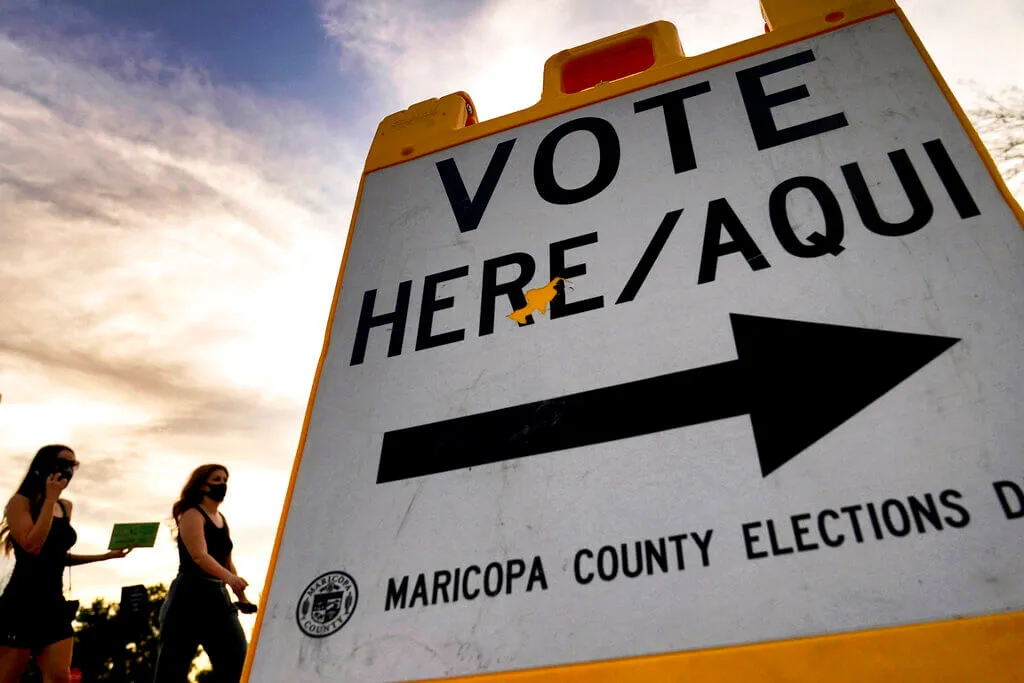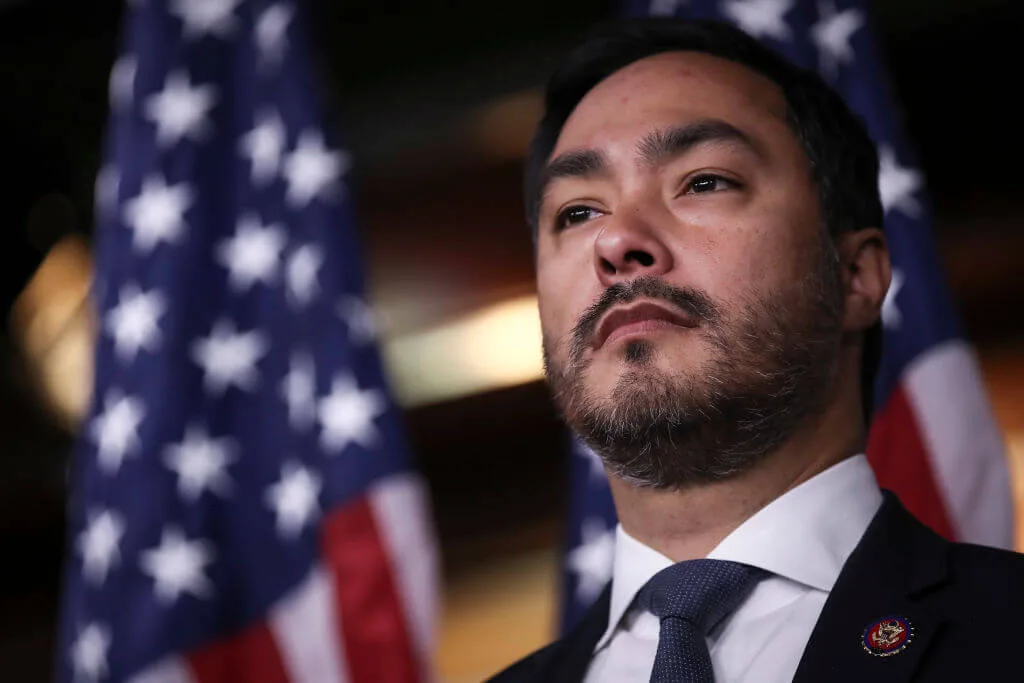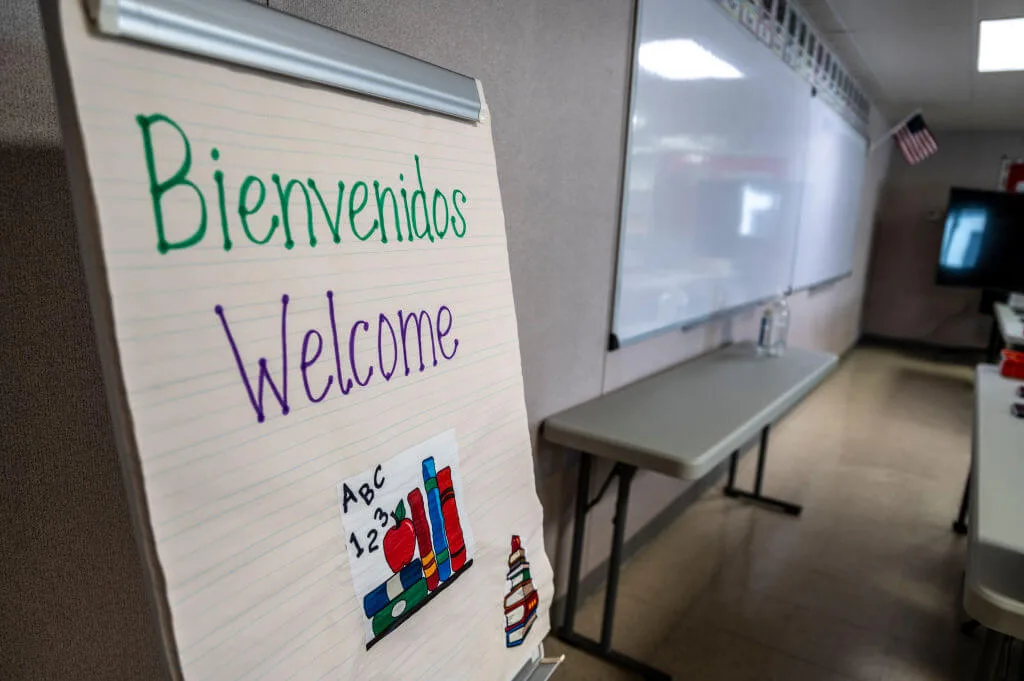
FILE - In this Aug. 6, 2019 file photo, Catalina Saenz wipes tears from her face as she visits a makeshift memorial near the scene of a mass shooting at a shopping complex in El Paso, Texas. El Paso is marking the year anniversary of the a shooting at a crowded Walmart by remembering the 23 people killed. Authorities have said the gunman traveled from his home near Dallas to target Latinos in the Texas border city on Aug. 3, 2019. (AP Photo/John Locher, File)
Events to mark the deadliest attack on Latinos took on a new layer of meaning amid the pandemic.
On August 3, 2019, Patrick Crusius, a 21-year-old anti-immigrant white male drove 656 miles from Allen, Texas to El Paso. His mission was to kill Latinos at a shopping complex that included a Walmart. The manifesto he posted online minutes before opening fire spoke of the “Hispanic invasion” of the state.
Crusius killed 23 people that day and injured another 22. He now faces state capital murder charges, a federal hate crime, and gun case that could also bring a death sentence.
On the one-year anniversary of that tragic event, Latinos gathered to honor the memory of those killed, while dealing with the coronavirus pandemic that is ravaging their community.

Image via Briana Sanchez/The El Paso Times via AP
Read more: This Is How Joe Biden Plans to Remake the American Economy
When Stephanie Meléndez, her husband, and two young daughters tested positive for the COVID-19, the person she most wanted to call was her father.
“I’m married, I have my family,” said Meléndez, 32. “He was still the one I called when I got sick, and he’d bring me Gatorade. So when we get this virus that’s been all over the news, oh, my dad’s not there for me to call. It just kind of hits home a little harder.”
Her father, David Johnson, was shielding his wife and granddaughter when the gunman shot him. It was a shockingly violent weekend in the U.S., with another shooter hours later killing nine people in a popular nightlife area in Dayton, Ohio.
Events to mark the anniversary of the El Paso shooting, a city that is largely Latino, took on a new look amid the coronavirus pandemic: parks lit with lanterns that people can walk or drive through; private tours for victims’ families at a museum exhibit of items preserved from a makeshift memorial; and residents being asked to show support with online posts.
When Guillermo “Memo” García died in April, nine months after he was shot in the Walmart parking lot while fundraising for his daughter’s soccer team, he became the shooting’s 23rd victim. Masked mourners gathered in a hospital parking lot to mark his death.
“It shook me to be reminded that we’re in the middle of a healing process, that we’re now being overwhelmed by COVID,” said El Paso County Judge Ricardo Samaniego, the county’s top executive.
A service for victims’ relatives was held Sunday in a sprawling park, allowing for social distancing. Afterward, members of the public were allowed to drive through the park as music plaid and lanterns floated on the lake.
Read more: Trump’s Failure to Reopen Safely Could Hurt Him on the Last Issue Voters Trust Him With: The Economy
“We can’t allow a shooter to define who we are, and we’re not going to allow a virus to define who El Paso is,” Samaniego said ahead of the ceremony.
Meléndez said her family would also mark the anniversary with a dinner at her father’s favorite steakhouse, adding she had felt the support of the city as the anniversary approached.
“Even if we can’t all get together, they’re still there, there are still ways,” she said.
El Paso residents describe the friendliness of the city, which has one of the lowest crime rates in the U.S. Many people have roots in both the U.S. and Mexico, frequently crossing the border. Several of those killed at Walmart had come from Mexico to shop.
On the morning of the shooting, Meléndez’s parents took their granddaughter Kaitlyn to Walmart to get new clothes and a basketball. They were at the checkout when the gunman fired, and David Johnson pushed his wife and granddaughter under the conveyor belt. Johnson was not Latino, but his wife and granddaughter are.
“That was always his priority, was his family, and he always put others first,” Meléndez says. “That showed that day.”
Struggling to deal with the aftermath, Kaitlyn, now 10, began to hit her stride again after switching to a smaller school. Then it closed because of the pandemic.
This summer, Kaitlyn was set to go to a camp for kids with post-traumatic stress disorder when she, her parents, and her 3-year-old sister tested positive for COVID-19. They recovered in about a week and no one had severe symptoms. But, Meléndez said, the worry that one of them might get worse was overwhelming.
“You’re like, ‘How can I do this again?'” Meléndez says. “We survived one thing and then we get hit with something else and it’s just — literally for me it’s like, OK, get through one day, gets to the next. And a lot of it is: What would my dad do right now?”
The Associated Press contributed to this story.
Politics

Teamsters and UPS Reach Tentative Deal to Avoid Strike, 340,000 Workers to Get Raises
The tentative deal represents a huge win for full- and part-time UPS Teamster workers, who would get significant pay raises and better working...



One Republican Senator Is Blocking 265 Military Promotions, Leaving the Marines Without a Confirmed Leader
Sen. Tommy Tuberville's decision means these military officers are not getting the pay raises they’re owed, cannot move their families to wherever...
Local News



Teamsters and UPS Reach Tentative Deal to Avoid Strike, 340,000 Workers to Get Raises
The tentative deal represents a huge win for full- and part-time UPS Teamster workers, who would get significant pay raises and better working...



One Republican Senator Is Blocking 265 Military Promotions, Leaving the Marines Without a Confirmed Leader
Sen. Tommy Tuberville's decision means these military officers are not getting the pay raises they’re owed, cannot move their families to wherever...




